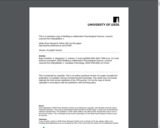
The field of infancy research faces a difficult challenge: some questions require samples that are simply too large for any one lab to recruit and test. ManyBabies aims to address this problem by forming large-scale collaborations on key theoretical questions in developmental science, while promoting the uptake of Open Science practices. Here, we look back on the first project completed under the ManyBabies umbrella – ManyBabies 1 – which tested the development of infant-directed speech preference. Our goal is to share the lessons learned over the course of the project and to articulate our vision for the role of large-scale collaborations in the field. First, we consider the decisions made in scaling up experimental research for a collaboration involving 100+ researchers and 70+ labs. Next, we discuss successes and challenges over the course of the project, including: protocol design and implementation, data analysis, organizational structures and collaborative workflows, securing funding, and encouraging broad participation in the project. Finally, we discuss the benefits we see both in ongoing ManyBabies projects and in future large-scale collaborations in general, with a particular eye towards developing best practices and increasing growth and diversity in infancy research and psychological science in general. Throughout the paper, we include first-hand narrative experiences, in order to illustrate the perspectives of researchers playing different roles within the project. While this project focused on the unique challenges of infant research, many of the insights we gained can be applied to large-scale collaborations across the broader field of psychology.
- Subject:
- Social Science
- Material Type:
- Reading
- Author:
- Casey Lew-Williams
- Catherine Davies
- Christina Bergmann
- Connor P. G. Waddell
- J. Kiley Hamlin
- Jessica E. Kosie
- Jonathan F. Kominsky
- Leher Singh
- Liquan Liu
- Martin Zettersten
- Meghan Mastroberardino
- Melanie Soderstrom
- Melissa Kline
- Michael C. Frank
- Krista Byers-Heinlein
- Date Added:
- 11/13/2020
